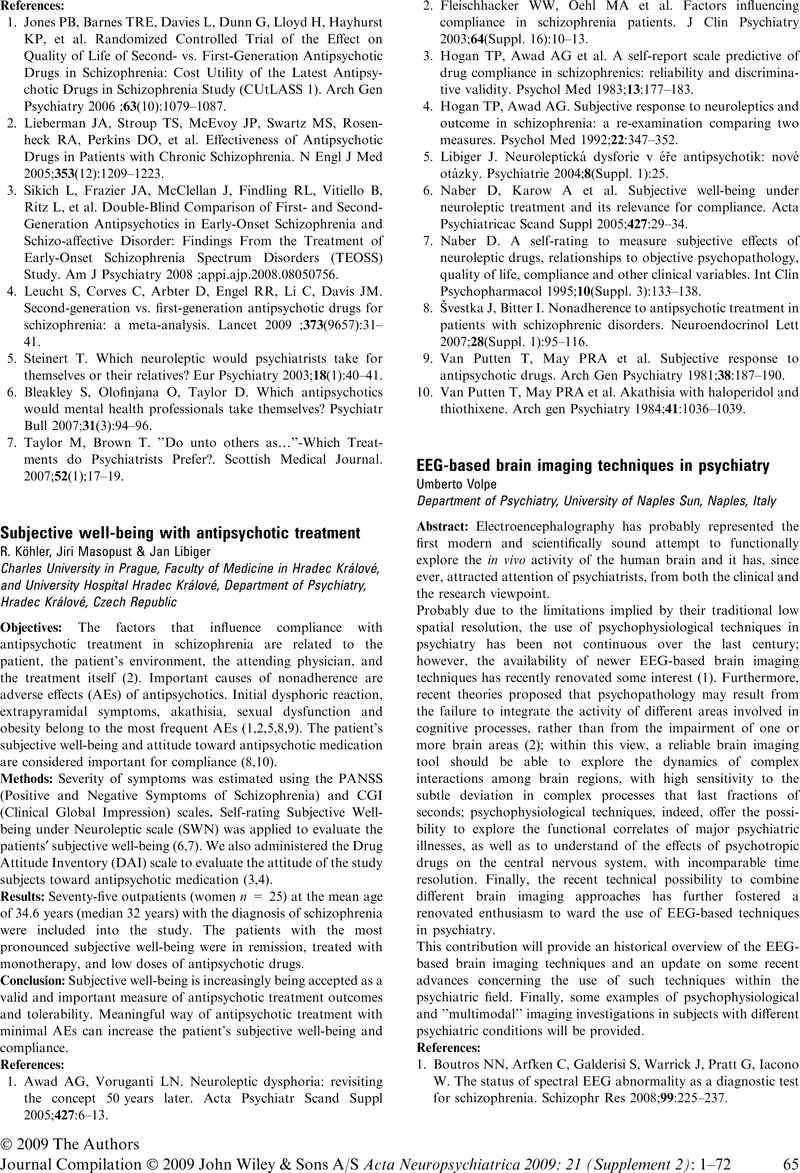No CrossRef data available.
Article contents
Subjective well-being with antipsychotic treatment
Published online by Cambridge University Press: 24 June 2014
Abstract
An abstract is not available for this content so a preview has been provided. Please use the Get access link above for information on how to access this content.

- Type
- Inpc Young Psychiatrists Programme
- Information
- Copyright
- Copyright © 2009 John Wiley & Sons A/S
References
References:
1.Awad, AG, Voruganti, LN.Neuroleptic dysphoria: revisiting the concept 50 years later. Acta Psychiatr Scand Suppl 2005;427:6–13.CrossRefGoogle Scholar
2.Fleischhacker, WW, Oehl, MAet al.Factors influencing compliance in schizophrenia patients. J Clin Psychiatry 2003;64(Suppl. 16):10–13.Google ScholarPubMed
3.Hogan, TP, Awad, AGet al.A self-report scale predictive of drug compliance in schizophrenics: reliability and discriminative validity. Psychol Med 1983;13:177–183.CrossRefGoogle ScholarPubMed
4.Hogan, TP, Awad, AG.Subjective response to neuroleptics and outcome in schizophrenia: a re-examination comparing two measures. Psychol Med 1992;22:347–352.CrossRefGoogle ScholarPubMed
5.Libiger, J. Neuroleptická dysforie v éře antipsychotik: nové otázky. Psychiatrie 2004;8(Suppl. 1):25.Google Scholar
6.Naber, D, Karow, Aet al.Subjective well-being under neuroleptic treatment and its relevance for compliance. Acta Psychiatricac Scand Suppl 2005;427:29–34.CrossRefGoogle Scholar
7.Naber, D. A self-rating to measure subjective effects of neuroleptic drugs, relationships to objective psychopathology, quality of life, compliance and other clinical variables. Int Clin Psychopharmacol 1995;10(Suppl. 3):133–138.Google ScholarPubMed
8.Švestka, J, Bitter, I.Nonadherence to antipsychotic treatment in patients with schizophrenic disorders. Neuroendocrinol Lett 2007;28(Suppl. 1):95–116.Google ScholarPubMed
9.Van Putten, T, May, PRAet al.Subjective response to antipsychotic drugs. Arch Gen Psychiatry 1981;38:187–190.CrossRefGoogle ScholarPubMed
10.Van Putten, T, May, PRAet al.Akathisia with haloperidol and thiothixene. Arch gen Psychiatry 1984;41:1036–1039.CrossRefGoogle ScholarPubMed




